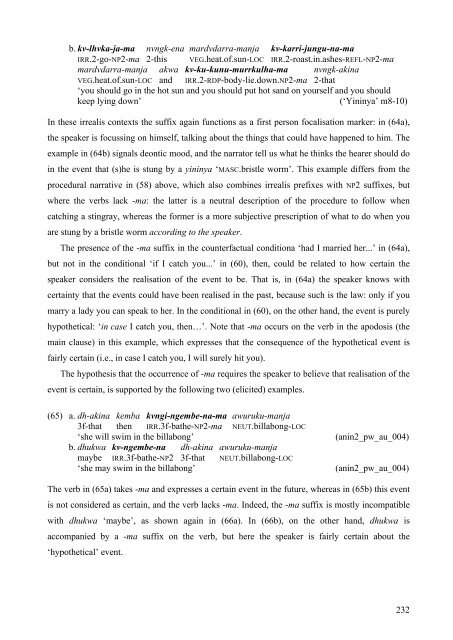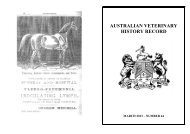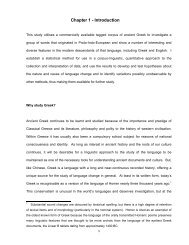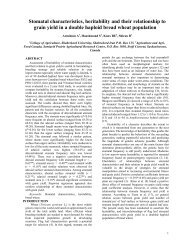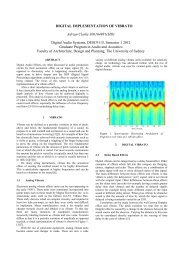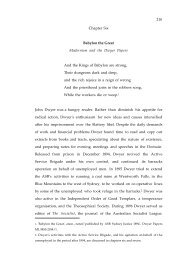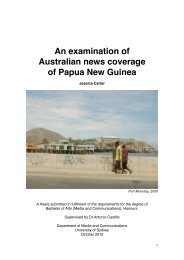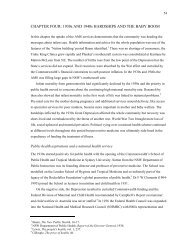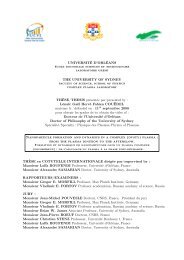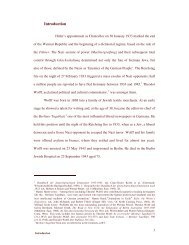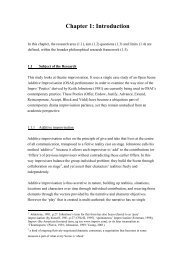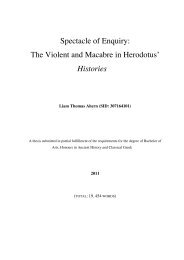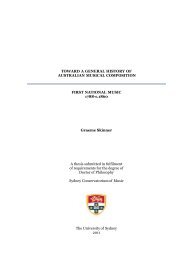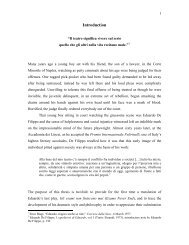Chapter 6: Tense, aspect and mood
Chapter 6: Tense, aspect and mood
Chapter 6: Tense, aspect and mood
You also want an ePaper? Increase the reach of your titles
YUMPU automatically turns print PDFs into web optimized ePapers that Google loves.
. kv-lhvka-ja-ma nvngk-ena mardvdarra-manja kv-karri-jungu-na-ma<br />
IRR.2-go-NP2-ma 2-this VEG.heat.of.sun-LOC IRR.2-roast.in.ashes-REFL-NP2-ma<br />
mardvdarra-manja akwa kv-ku-kunu-murrkulha-ma nvngk-akina<br />
VEG.heat.of.sun-LOC <strong>and</strong> IRR.2-RDP-body-lie.down.NP2-ma 2-that<br />
‘you should go in the hot sun <strong>and</strong> you should put hot s<strong>and</strong> on yourself <strong>and</strong> you should<br />
keep lying down’ (‘Yininya’ m8-10)<br />
In these irrealis contexts the suffix again functions as a first person focalisation marker: in (64a),<br />
the speaker is focussing on himself, talking about the things that could have happened to him. The<br />
example in (64b) signals deontic <strong>mood</strong>, <strong>and</strong> the narrator tell us what he thinks the hearer should do<br />
in the event that (s)he is stung by a yininya ‘MASC.bristle worm’. This example differs from the<br />
procedural narrative in (58) above, which also combines irrealis prefixes with NP2 suffixes, but<br />
where the verbs lack -ma: the latter is a neutral description of the procedure to follow when<br />
catching a stingray, whereas the former is a more subjective prescription of what to do when you<br />
are stung by a bristle worm according to the speaker.<br />
The presence of the -ma suffix in the counterfactual conditiona ‘had I married her...’ in (64a),<br />
but not in the conditional ‘if I catch you...’ in (60), then, could be related to how certain the<br />
speaker considers the realisation of the event to be. That is, in (64a) the speaker knows with<br />
certainty that the events could have been realised in the past, because such is the law: only if you<br />
marry a lady you can speak to her. In the conditional in (60), on the other h<strong>and</strong>, the event is purely<br />
hypothetical: ‘in case I catch you, then…’. Note that -ma occurs on the verb in the apodosis (the<br />
main clause) in this example, which expresses that the consequence of the hypothetical event is<br />
fairly certain (i.e., in case I catch you, I will surely hit you).<br />
The hypothesis that the occurrence of -ma requires the speaker to believe that realisation of the<br />
event is certain, is supported by the following two (elicited) examples.<br />
(65) a. dh-akina kemba kvngi-ngembe-na-ma awuruku-manja<br />
3f-that then IRR.3f-bathe-NP2-ma NEUT.billabong-LOC<br />
‘she will swim in the billabong’ (anin2_pw_au_004)<br />
b. dhukwa kv-ngembe-na dh-akina awuruku-manja<br />
maybe IRR.3f-bathe-NP2 3f-that NEUT.billabong-LOC<br />
‘she may swim in the billabong’ (anin2_pw_au_004)<br />
The verb in (65a) takes -ma <strong>and</strong> expresses a certain event in the future, whereas in (65b) this event<br />
is not considered as certain, <strong>and</strong> the verb lacks -ma. Indeed, the -ma suffix is mostly incompatible<br />
with dhukwa ‘maybe’, as shown again in (66a). In (66b), on the other h<strong>and</strong>, dhukwa is<br />
accompanied by a -ma suffix on the verb, but here the speaker is fairly certain about the<br />
‘hypothetical’ event.<br />
232


